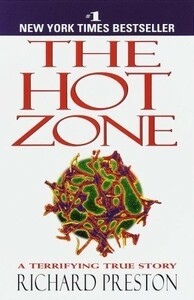Take a photo of a barcode or cover
reflective
medium-paced
It was just ok. It was about ebola, and really could have been a long article about it, really. I wouldn't recommend it, expect maybe to someone who wants to know the very basics about a virus outbreak.
adventurous
challenging
dark
mysterious
tense
medium-paced
dark
informative
mysterious
reflective
tense
medium-paced
Disclaimer: My experience was colored by the fact that I listened to it in audiobook format. I thought the level of graphic detail provided was sometimes unnecessary; and, while I appreciated the narrative flair, the obvious suspense surrounding Nancy J's incident was more off-putting than intriguing. Things I do appreciate: the journalistic effort, and that Preston made a potentially dry, uninviting, and niche subject so accessible and relatable. Overall, I'd recommend it as light reading to see how the discovery of Marburg/Ebola unfolded - but perhaps look elsewhere for a deeper or more scientific dive.
This was an excellent book; scary and gross with out being extremely graphic. My one complaint is there needs to be a synonym for monkey. I swear they used monkey three or four times in one sentence a few times and dozens of times in one paragraph. But, that is a small complaint.
dark
informative
mysterious
medium-paced
Do not get Ebola.
Do not get near Ebola.
Don't even think about Ebola.
Reading the history of Marburg, Ebola Sudan, Ebola Zaire, and Ebola Reston was one of the most gruesome and terrifying things I've experienced (and I'm no novice to gore and horror). This book recounts the discovery of filoviruses from the 70s to the early 90s and the experiences of trying to treat and trace the origins of filoviruses, such as Ebola.
It is staggering to read about the complete lack of safety precautions that led to many outbreaks. It's horrifying to read about people hiding exposure and traveling while sick (with vivid descriptions that will never leave my mind). I will never again doubt a zombie story with people hiding their bites. It's fascinating to read about the level of unknown and fear experts had of these viruses. There are a lot of lessons to be learned here.
Since this book ends in the '90s, I immediately went to Wikipedia for the modern scoop on Ebola. Delightfully, I learned there is now a vaccine and two experimental treatments. Less delightfully, this came only after several more modern, deadly epidemics.
I rated this 4 stars because while engaging and informative, the author really sensationalized a lot of it. I get it, it's more readable this way, but it felt a bit like an action movie at times.
Do not get near Ebola.
Don't even think about Ebola.
Reading the history of Marburg, Ebola Sudan, Ebola Zaire, and Ebola Reston was one of the most gruesome and terrifying things I've experienced (and I'm no novice to gore and horror). This book recounts the discovery of filoviruses from the 70s to the early 90s and the experiences of trying to treat and trace the origins of filoviruses, such as Ebola.
It is staggering to read about the complete lack of safety precautions that led to many outbreaks. It's horrifying to read about people hiding exposure and traveling while sick (with vivid descriptions that will never leave my mind). I will never again doubt a zombie story with people hiding their bites. It's fascinating to read about the level of unknown and fear experts had of these viruses. There are a lot of lessons to be learned here.
Since this book ends in the '90s, I immediately went to Wikipedia for the modern scoop on Ebola. Delightfully, I learned there is now a vaccine and two experimental treatments. Less delightfully, this came only after several more modern, deadly epidemics.
I rated this 4 stars because while engaging and informative, the author really sensationalized a lot of it. I get it, it's more readable this way, but it felt a bit like an action movie at times.
A highly infectious disease has broken out in a monkey house in suburban DC. Scientists, the Army, and CDC join together to contain the outbreak before it can break into the human population.
Preston does a good job presenting human cases of Ebola which sets the tone for exactly how dangerous the outbreak of disease in the DC monkey house could be. After having done as much research into Ebola as he appears to have done, one would think that he would have a healthy respect for it and not try to put himself in danger of the disease. He is quite foolish in going to an area where Ebola is suspected to have originated with a bare minimum of necessary supplies.
Preston does a good job presenting human cases of Ebola which sets the tone for exactly how dangerous the outbreak of disease in the DC monkey house could be. After having done as much research into Ebola as he appears to have done, one would think that he would have a healthy respect for it and not try to put himself in danger of the disease. He is quite foolish in going to an area where Ebola is suspected to have originated with a bare minimum of necessary supplies.
In the 1980s an animal lab outside Washington D.C. has an outbreak of Ebola virus within its monkey population. The Army and CDC move in to eradicate it, not entirely sure what they're working with and fraught with fear, politics and secrets. And it's all true.
It sounded so good. So why didn't I like it better? The author jumps between stories in Africa (more intriguing) and the outbreak in America (less so). The connections to characters are weak. It all just goes away. The final investigation in an African cave is confusing. A more personal story would have been more gripping.
It sounded so good. So why didn't I like it better? The author jumps between stories in Africa (more intriguing) and the outbreak in America (less so). The connections to characters are weak. It all just goes away. The final investigation in an African cave is confusing. A more personal story would have been more gripping.


